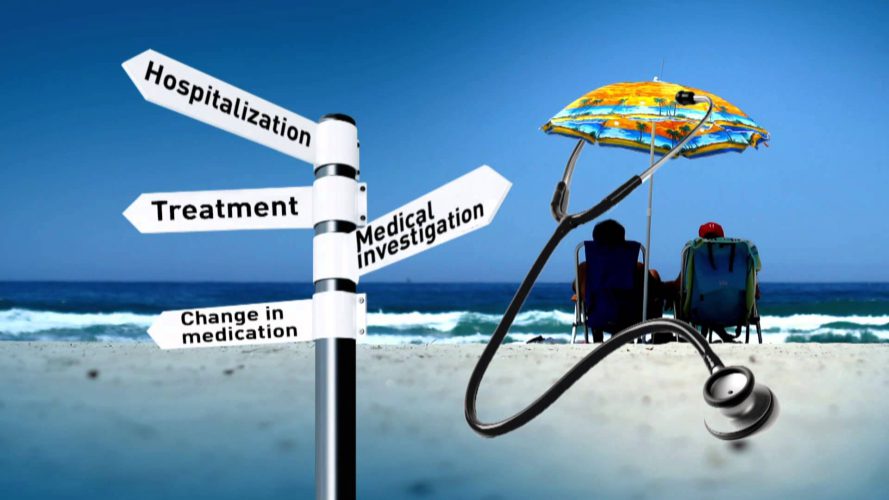Also known as healthcare tourism, this niche was coined several years ago, although not so new now , the medical tourism industry is bolstering Turkey’s economy no end. The growth numbers are outstanding . In 2017 alone Turkey had a 31 percent increase in health tourism with a staggering 7.2 billion dollars of business done from foreign visitors. European Business checks out their boom sector.
Dental care, cosmetics, elective surgery, fertility treatments — you name it. There’s something for everyone there, and the prices alone are the main reason why people stop by.
The healthcare tourism industry in Turkey is a part of the 2023 vision plan, which is also part of a wide range of goals that Turkish government wants to achieve by 2023.
And these plans are truly ambitious. Right now, Turkey holds fourth place in the world for medical tourism, a mild increase from 2014, when it was ranked 6th. However, it aims to become the number one in the rankings by 2023. And, while in the process, they have ambitious plans and hope to generate $20 billion in revenue every year until then.
While this plan on the surface looked ambitious , the figures tell us that it’s actually working. According to data which was released by the Turkish Statistical Institute, the Health tourism sector in the country managed to increase by 12 %, reaching 5.8 billion dollars in 2016 with more than 750 thousand patients arriving from 144 different countries. Industry insiders say that they are are likely to improve the already impressive historic record which was reached in 2017, as health tourism in Turkey continues to boom.
So why the increase? Looking more in depth at this record surge in visitors to Turkey , it turns out that the average medical tourist actually spends almost 10 times more than the average leisure tourist does, according to the Association of Health Strategies and Social Policies (SASOMER). That’s why the Turkish government has given its full support and it is also why it spends so much effort globally promoting and advertising its health sector..
Over the last 10 years alone, the Turkish government has invested 30 billion dollars more in new hospitals than its technology sector which should give you some idea of where the government has its priorities.
“I can spend as much as I want,“ said E. Cakman, chairman and founder of the Turkish Healthcare Travel Council (THTC), when asked about the budget allocated by the Turkish government for promoting the health tourism industry abroad. “There is a budget, but it is so big that I am spending a lot of money, and it never ends. Whatever I plan to do every year, I get to do it, and there is still money left“.
TV advertising, magazines, exhibitions, conferences, workshops, International medical tourism events — all tools are used to reach the highest results in marketing and advertising medical tourism sector in Turkey.
Turkish airlines even offers a discounted healthcare and cosmetic procedures to its regular flyers! It’s all about publicity, which is definitely paying off.
Another reason why medical tourism in Turkey is receiving so much attention is also its exceptionally great geographical location which helps attract people from both Europe and Asia as well as , Russia, Kuwait, Dubai, Lebanon.
Then, as we know the competitive price factor, which comes with exceptional quality in Turkey. The Turkish Travel Agencies Association noted after they did a global survey that Turkey charges the same procedures as developed countries, but at half the cost, which for your average patient, can help save thousands of dollars.
Where Turkey really comes into its own is its level of hospitality,which is more word of mouth but once added to medical tourism, it becomes a significant factor. In Turkey, performing a procedure is just a part of it. Clinics and hospitals always arrange a full package for their clients, where every little detail is taken care of , starting from when you arrive at the airport to organising sightseeing tours, hotels , restaurants to when you depart from the airport.
T. Buzgan, the Chairman of the SASOMER Association, notes that “medical tourism providers in Turkey mostly serve in the areas of eye diseases, oncology, neurosurgery, orthopaedics, oncotherapy, and cosmetic surgeries like hair transplantation.“, adding that “affordable and qualified health service, short waiting times compared to European countries, and modern and well-equipped hospitals may enable Turkey to claim a bigger share from global healthcare tourism.“
Turkey has already obtained a reputation for being a hub for hair transplant and physiotherapy services, welcoming patients from almost 60 countries, including Middle Eastern, Arabic and European countries, as well as such African countries like Nigeria, Kenya, Tanzania and Ethiopia.
Every year there are more than 25 thousand patients who come to the country for eye surgeries. Turkey is actually becoming the leading destination country for patients who suffer from cataracts and macular degeneration.
To add to that , even more people are coming to Turkey for hair transplants. A staggering 200 hair transplant surgeries are performed daily via hundreds of clinics around the country.Not hard to understand when you look at the the United Kingdom and the US where hair transplant procedures costs $25,000 while in Turkey you can have it for a mere $1500 .Actually, the complete
package that includes travel, surgery, luxury hotel, airport shuttle service and the sightseeing that we’ve mentioned before, adds up to be cheaper than the surgery itself in any other destination in Europe.
Patients from Arab countries here discovered natural thermal springs healing procedures that are known for healing properties against skin diseases, depression, gastro-intestinal, respiratory disorders, especially rheumatism.
However, hair transplantation procedures do not make the biggest market when it comes to medical tourism in Turkey: It is noted that about 32 percent of patients come here for oncology treatments.
Turkey offers really solid reasons to try medical tourism, as this sector has been driven by increased investment in health facilities and treatment technology over the past decade. Positron emission tomography, Da Vinci robotic assisted surgery, Cyberknife, Gammaknife, Radiotherapy, Nuclear medicine — you name it, they have it. And, what is more, the procedures are performed in a health facilities that own ISO 9001 certificates and Joint Commission International (JCI) accreditations.
Health tourism in Turkey is very heavily regulated, and medical facilities — in order to get necessary accreditations — need to fit certain standards, which are high.
All this is necessary to assure the best possible medical services to the patients. And there’s no compromising on this one, as JCI takes it all to the next level: 1000 criteria must be met to get the accreditation, and it has to be renewed every 3 years.
In Turkey, 46 clinics can be proud to be on this list. B. Ulusoy, chairman of the Turkish Travel Agencies Association (TURSAB), said that “the growing number of Turkish hospitals with international certification, and reasonable costs have truly boosted the country’s health tourism sector.“
And so why not ?who would begrudge you a little R and R after a little TLC of high level health procedures.









































